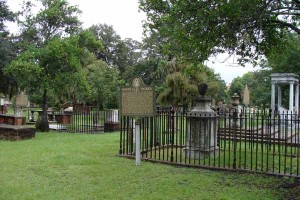Year Erected: 1957
Marker Text: A native of Yorkshire, Joseph Clay (1741-1804) settled at Savannah at the age of nineteen. His uncle, James Habersham, declared that his "Industry" was "highly commendable" and "his Abilities for Trade unquestionable." Fulfilling his early promise, Clay prospered in Georgia as a merchant and rice planter.
He was a staunch supporter of American rights, served on the Council of Safety and in the Provincial Congress, and took part in the celebrated raid on the Royal powder magazine at Savannah in 1775. During the Revolutionary War Clay rendered efficient and faithful service to the American cause as deputy paymaster general of the Continental Army for the Southern Department. His career in the Revolution was distinguished by "Virtue & fortitude," said General James Jackson, who also paid high tribute to Clay's wife Ann (whose remains also lie here) for her beneficent care of the American wounded after the Battle of Camden.
In the years following the Revolution Joseph Clay held several positions of importance, including state treasurer and judge of the inferior court. He was one of the first trustees for the state college that later became the University of Georgia. He died Dec. 15, 1804. Joseph Clay's published letters (1776-1793) constitute a valuable historical source work for the period.

